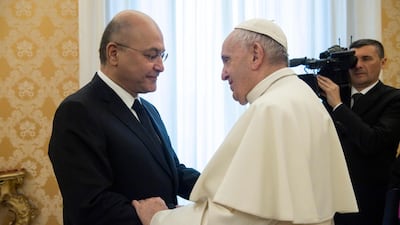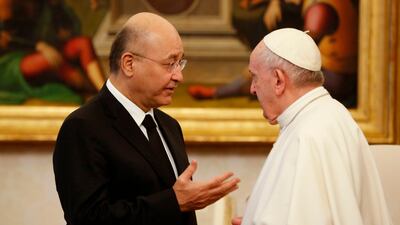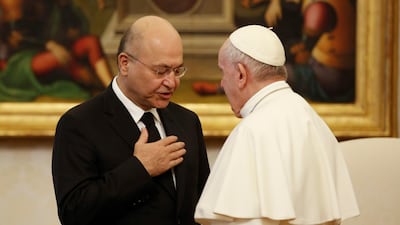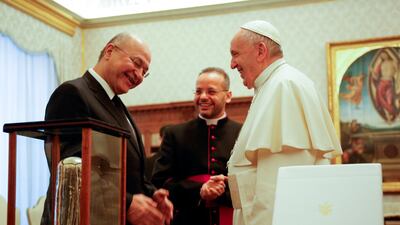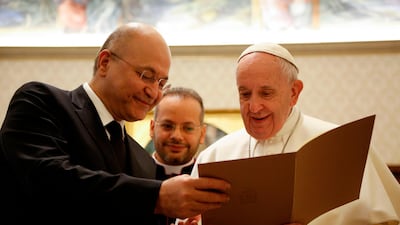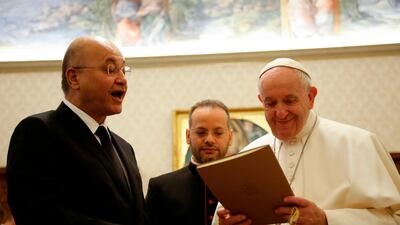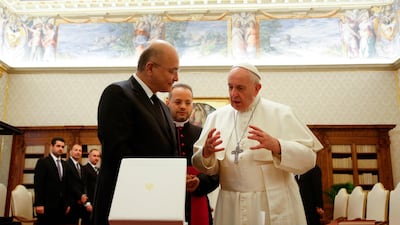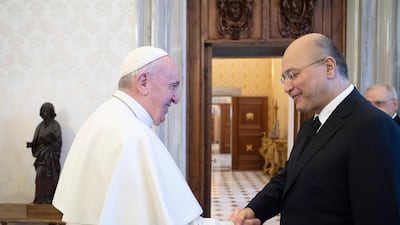Pope Francis has changed the Iraqi public’s perception of Christians, the head of Iraq’s Catholic Church said, a year after the pontiff made a historic trip to the country.
Cardinal Louis Raphael Sako, Patriarch of Babylon of the Chaldeans and head of the Chaldean Catholic Church, told The National the level of respect towards Christians has increased immensely since the Pope’s visit.
“The visit was a blessing for Iraq and a point of change, as Iraq finally opened up to the world,” Cardinal Sako said.
“I have to be honest with you, it has changed the way ordinary people think and their perceptions about coexistence among different religions in Iraq has shifted for the better.”
More Iraqis have started to accept the concept of diversity, he said.
“We barely hear that someone saying, 'this person is a Christian or a Muslim,'” Cardinal Sako said in a phone call from Baghdad.
The visit by Pope Francis sent a message of encouragement to not only his 1.3 billion followers but to those Iraqis attempting to recover from the extremist rule of ISIS and those growing disillusioned with their government.
The pontiff's visit from March 5 to March 8 last year consisted of trips to Baghdad, Ur — a city linked to the Old Testament figure Abraham — Erbil, Mosul and Qaraqosh in the Nineveh plains.
On the visit, Pope Francis repeatedly called for Iraqis to come together.
“Let the guns fall silent,” he said during a speech at the Presidential Palace in Baghdad. “Enough violence, enough polarisation ... let us help the citizens who want to build this nation.”
Cardinal Sako, 73, hopes these messages will be absorbed by Iraqi society.
“The Pope sent messages of coexistence, brotherhood, integration, dignity, equality and freedom, which were imprinted in the hearts and minds of many Iraqis,” he said.
The religious leader said Christians can now walk through the streets of Iraq with their heads high.
“We used to hear vulgar words and statements but not as much any more. Even the statements in mosques ... have been positive and have encouraged integration,” he said.
Pope's visit did not bring more Iraqi Christians home
However, Cardinal Sako said there are only about 500,000 Christians left in Iraq.
After sectarian warfare broke out among Muslims after the 2003 US-led invasion, many Christians in Iraq fled abroad from the violence.
The plight of those who remained worsened when ISIS extremists seized a third of the country in 2014 and persecuted religious minorities. By 2017 ISIS had been ousted from most of its territory, including Mosul, capital of Iraq's Nineveh governorate.
“Iraqi Christians are looking for freedom and stability and want to stay away from problems,” Cardinal Sako said, adding that if the government is calling for Christians to return, they must “create safe and stable conditions.”
“This [current situation] does not encourage an Iraqi, whether he is Christian who wants dignity and freedom or not, to return home,” he said.
Reverend Karam Shamasha of Nineveh said that although the pope's visit gave hope, “the bleeding of emigration continues".
“The situation in the Nineveh plains is still unstable and unbearable for Iraqi citizens, therefore we are seeing a continuation of migration,” he told The National.
Difficult economic conditions, lack of job opportunities — especially for young graduates — harassment in the workplace and favouritism have all contributed to the decline in numbers of Christians in Iraq, he said.
Rev Shamasha said that security for Christians does not exist in Iraq and that is why the group is on the path to becoming almost extinct.
“What makes us weak in the eyes of others is that we do not have a tribe, clan or armed militias. Our main reference as Christians remains in the hands of the Church that calls its mission to be the transmitters of peace,” he said.
The Church has been calling for its followers to join government institutions but not armed militia groups.
“We believe that we can save Iraq with the existence of strong state institutions whose sole loyalty is to unite the country,” he said.
Rev Shamasha believes Iraq is a country that’s “enough for all” but the problem lies “that some narrow hearts do not want to unite to bridge a new future for the next generation”.
“If ambitions are removed, Iraq will be a country for everyone to live in peace and harmony,” he said, adding this was the message of Pope Francis’s visit.
Iraqis are ‘exhausted’
Cardinal Sako said Iraqis are worn out following decades of wars, sanctions and lack of good governance.
“We are exhausted. Iraq is a country rich in resources, there’s no justification for corruption — no religion would accept what is happening,” he said.
Cardinal Sako called on Iraqis to unite and tell the truth, “so we can see changes".
"Religion reflects the person’s conscience”.
